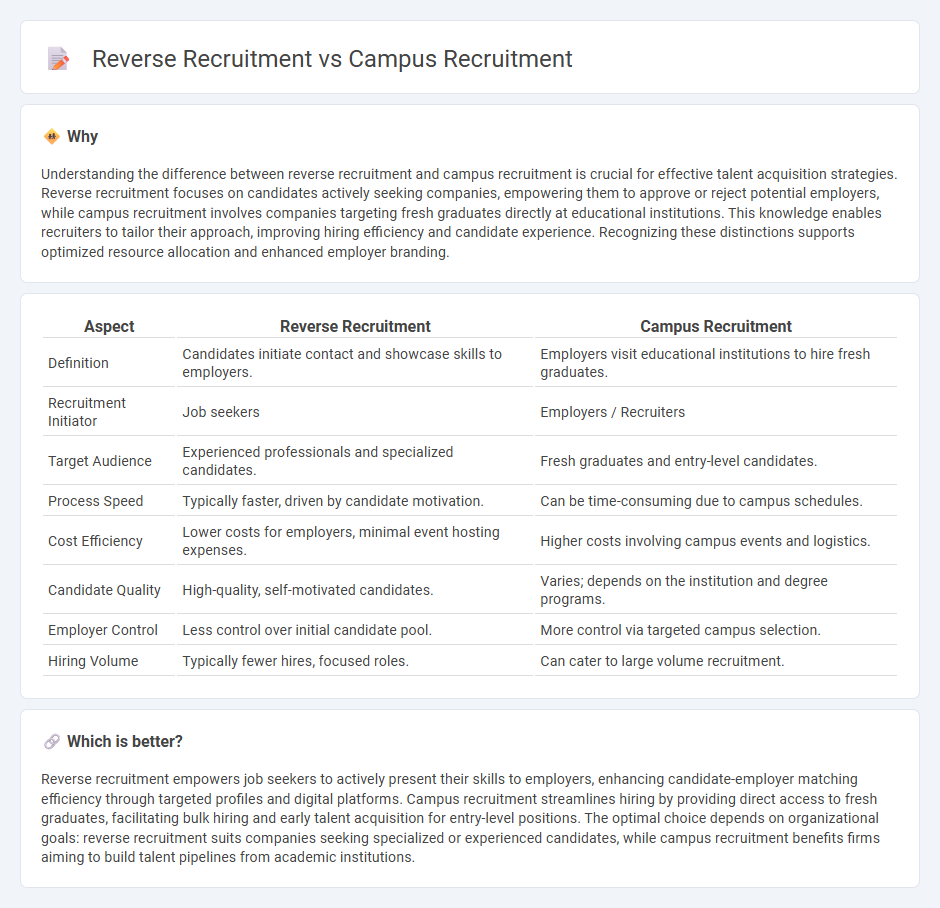
Reverse recruitment empowers candidates to proactively connect with employers by showcasing their skills and ambitions, shifting traditional power dynamics in the hiring process. Campus recruitment targets fresh graduates through structured university partnerships, streamlining talent acquisition from academic institutions. Explore the advantages of both approaches to optimize your hiring strategy.
Why it is important
Understanding the difference between reverse recruitment and campus recruitment is crucial for effective talent acquisition strategies. Reverse recruitment focuses on candidates actively seeking companies, empowering them to approve or reject potential employers, while campus recruitment involves companies targeting fresh graduates directly at educational institutions. This knowledge enables recruiters to tailor their approach, improving hiring efficiency and candidate experience. Recognizing these distinctions supports optimized resource allocation and enhanced employer branding.
Comparison Table
| Aspect | Reverse Recruitment | Campus Recruitment |
|---|---|---|
| Definition | Candidates initiate contact and showcase skills to employers. | Employers visit educational institutions to hire fresh graduates. |
| Recruitment Initiator | Job seekers | Employers / Recruiters |
| Target Audience | Experienced professionals and specialized candidates. | Fresh graduates and entry-level candidates. |
| Process Speed | Typically faster, driven by candidate motivation. | Can be time-consuming due to campus schedules. |
| Cost Efficiency | Lower costs for employers, minimal event hosting expenses. | Higher costs involving campus events and logistics. |
| Candidate Quality | High-quality, self-motivated candidates. | Varies; depends on the institution and degree programs. |
| Employer Control | Less control over initial candidate pool. | More control via targeted campus selection. |
| Hiring Volume | Typically fewer hires, focused roles. | Can cater to large volume recruitment. |
Which is better?
Reverse recruitment empowers job seekers to actively present their skills to employers, enhancing candidate-employer matching efficiency through targeted profiles and digital platforms. Campus recruitment streamlines hiring by providing direct access to fresh graduates, facilitating bulk hiring and early talent acquisition for entry-level positions. The optimal choice depends on organizational goals: reverse recruitment suits companies seeking specialized or experienced candidates, while campus recruitment benefits firms aiming to build talent pipelines from academic institutions.
Connection
Reverse recruitment empowers candidates to actively seek employers, complementing campus recruitment where employers target fresh graduates at educational institutions. Both strategies enhance talent acquisition by bridging the gap between job seekers and recruiters, facilitating effective matching of skills and opportunities. Integration of reverse recruitment platforms with campus recruitment events increases engagement, streamlining the hiring process for entry-level positions.
Key Terms
Talent Acquisition
Campus recruitment streamlines talent acquisition by targeting fresh graduates with specific academic backgrounds to meet organizational skill demands. Reverse recruitment shifts the dynamic, empowering candidates to present themselves proactively to potential employers through tailored showcases and networking events. Explore more about how these strategies impact talent acquisition effectiveness.
Employer Branding
Campus recruitment emphasizes direct engagement with students through job fairs and internships, fostering early brand recognition within academic communities. Reverse recruitment allows candidates to showcase their skills and personalities to employers through innovative platforms, enhancing employer branding by highlighting company culture and openness. Explore how combining both approaches can elevate your talent acquisition and employer brand strategy.
Job Matching
Campus recruitment traditionally involves employers visiting educational institutions to hire fresh graduates, ensuring a streamlined process for entry-level job placement. Reverse recruitment flips this model by allowing candidates to showcase their skills first, enabling employers to select based on demonstrated potential and fit. Discover innovative job matching strategies by exploring the evolving landscape of recruitment approaches.
Source and External Links
Everything You Need to Know About Campus Recruitment - Yello - Campus recruitment is a strategy for sourcing and hiring young talent from colleges year-round, with key tactics including knowing your audience, building talent communities, and leveraging referrals from recent graduates.
20 Creative Campus Recruitment Strategies You Need to Know - Effective campus recruitment involves participating in campus events, collaborating with student organizations, building relationships with career services, and engaging with specific academic departments to connect with ideal student candidates.
What Is Campus Recruitment? Build a Winning Strategy - Oleeo - A successful campus recruitment strategy requires clear understanding of hiring needs, connecting closely with career centers, and building relationships with professors to identify and attract the best student talent.
 dowidth.com
dowidth.com